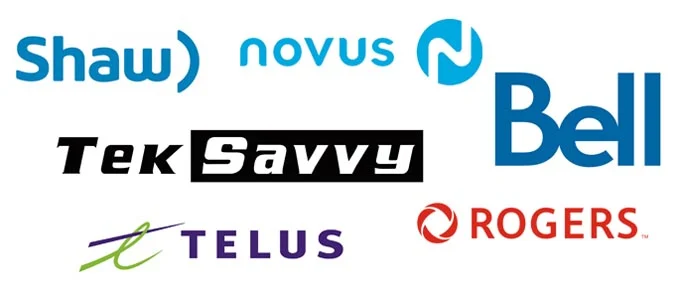Internet service providers

The first thing to know is that residential packages for internet in Canada cost more than in many other countries.
One reason for this is the sheer breadth of Canada. Canada’s internet providers can cost a lot to maintain a network that operates in separate and far apart locations, and this cost is spread to users across the country.
It has also been suggested that Canada’s biggest internet service providers are using their internet customers to recoup falling revenue from their TV offering, as more and more customers ditch traditional cable TV.
So it’s important to make sure you get the best deal.
When you’re moving into an apartment, check which internet service providers are already operating on the premises. Some apartment buildings have special deals, and some tenant agreements will have service from ISPs in Canada already included in the cost. Don’t spend more than you have to.
Newcomer to Canada?
Stay up-to-date with latest immigration developments – as anyone will tell you, changes happen regularly that can affect your move.
Main internet service providers in Canada

Availability will depend on your location. For instance, Bell and Rogers are the big internet service providers in Ontario, while Shaw and Telus are the main players competing in western provinces.
Users in many discussion forums you’ll come across recommend Novus. However, they operate in very few locations. Their service is only available in certain apartment buildings in Vancouver.
TekSavvy is one of several Canadian internet providers who largely depend on the infrastructure of its bigger competitors.
We’ve listed these six ISPs in Canada and assessed their products. Read our advice first and keep it in mind when assessing the internet service providers available at your address.
Which internet in Canada option is best for me?
There are a number of factors to consider, including download and upload speeds, data caps, and cost.
Don’t be shy about asking internet service providers for detail on these, and explaining to them how you typically use the internet. It’s their job to ensure you’re informed about the package you’re buying.
If there’s anything the person you’re speaking to seems unsure of, feel free to politely ask them to check with their support managers for an answer.
Download / upload speed
Any data that comes from the internet TO your device relies on your downloading stream to get there. The higher the speed, the faster this data is likely to get to your device.
You can get by with very little if you’re doing some light web browsing. Examples would be checking email, reading articles like those on Moving2Canada, and looking at some photos on Facebook from time to time.
Other activities require more data to be transferred. A common example would be video, and in particular, video that has a very clear picture.
Netflix, for instance, recommends download speeds of at least five megabits per second (Mbps) to watch HD video, and 25Mbps to watch Ultra HD (very high-quality) video.
Any data that goes to the internet FROM your device relies on your uploading stream to get there.
Every time you type in a web address, or search something on Google, you’re sending data from your device to the internet. These are relatively simple tasks that don’t require a very high upload speed.
More intense activities would be a Skype call, for example. When you’re streaming live imagery from your web camera to another web user, you’ll need a strong upload speed to send video that’s of a viewable quality.
Skype recommends an upload speed of at least 1.5Mbps.
Other issues to consider:
- Your patience. Slower download / upload speeds means data will transfer more slowly. If you want web pages to load more quickly, then pay for a higher speed from your Canadian internet provider.
- How many people / devices will be connecting to the internet? If you pay for a 10Mbps download speed, and six people are all connected to it at the same time, you’ll end up with some very slow internet indeed.
- Will you be connecting over the wireless, WiFi connection, instead of directly to the modem with a cable? The advertised speeds apply to wired connections. Speeds weaken over WiFi, and deteriorate the further you go away from the router. You may need to pay a little extra to get yourself some wriggle room.
Data caps
Most Canada internet plans have a limit to how much data you can upload and download in any given month.
You will usually be able to check how much you’re using on an online tracker. If you’re otherwise happy with a package, but are concerned you might breach the data cap, it would be a good idea to trial it for a month, monitor your usage, and upgrade later if needs be.
Let’s say there are two of you in the house. You both watch Netflix and stream some live TV for an hour or two a night. You also look at Facebook, and check websites like Moving2Canada on your desktop and your phone. You both FaceTime for about two hours in total per week. It’s unlikely that you’ll exceed 200GB per month.
On the market since 2006
We know the industry inside out: the details of the Due Diligence process for each citizenship and residence permit by investment program, when an affidavit is needed and the best way to resolve our clients’ problems.
Licensed agent
We work exclusively with government-licensed citizenship and residence permit by investment programs in the European Union and the Canadian.
Schedule a meeting
Let’s discuss the details
Schedule a meeting at one of the offices or online. A lawyer will analyze the situation, calculate the cost and help you find a solution based on your goals.
- Preparation of documents
- Due Diligence

10 things you should know before going to canada Buying a car in Canada Buying your first home in Canada Canadian Citizenship Canadian Study Permit Choosing the right study program Essential packing checklist Exploring destinations Express Entry Filing taxes in Canada Finding accommodation Finding a job in Canada Finding the right school Immigrants Job interview questions Learn Earn Stay Leaving your home country Opening a student bank account Open Work Phone providers in Canada Picking a destination Plan your banking Post-Graduation Work Permits Prepaid vs. Contract Plans Preparing for arrival Ship your belongings Starting your career Student accommodation study in Canada Study Permits Study Program Super Visa The International Student Roadmap The Letter of Acceptance The Student Direct Stream (SDS) Tips for exam period Top 10 reasons to study in Canada Transfer your money cheaply Travel & health insurance Utilities providers Work in Canada Work while studying write a Canadian resume Your first week in Canada Your first week in Canada student

